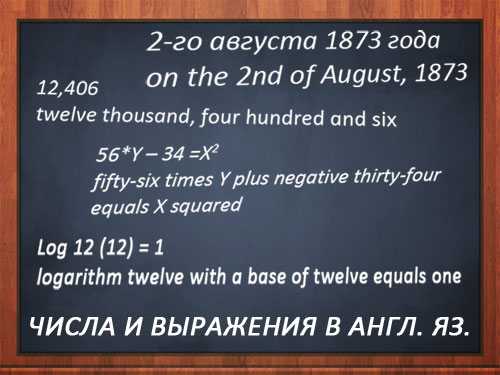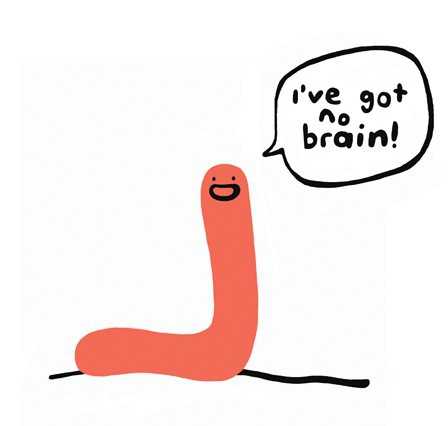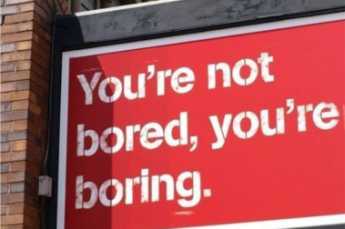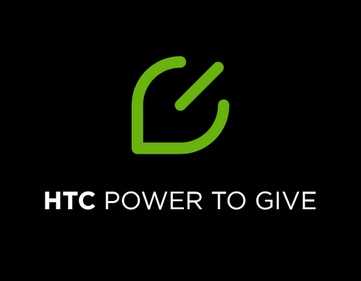Секреты английского языка. Look глагол правильный или неправильный
Формы глагола look | Секреты английского языка
Глагол look, который на русский язык переводится как «смотреть, глядеть» на первый взгляд кажется довольно простым, однако это не так. Есть много нюансов его использования, которые мы постараемся подробно охватить в данном посте.
Формы глагола look
Глагол look является правильным, и его формами будут :
Google shortcode
В нижеследующей таблице указаны всевозможные варианты использования этого глагола: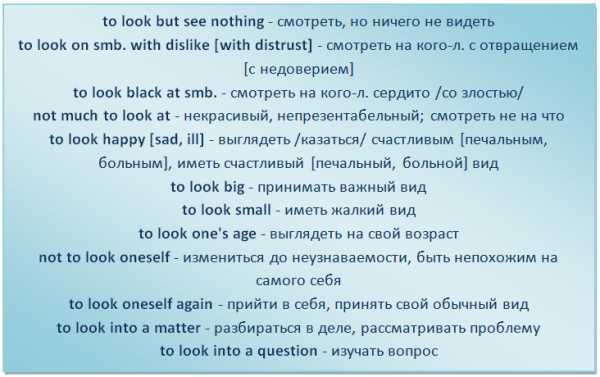
Рассмотрим употребление глагола look на примерах:
- Look this way! — смотри сюда /в эту сторону/
- He made me look small — он меня унизил
- You don’t look yourself — а) вас узнать нельзя; б) на вас лица нет
- Everybody looked tired — у всех был усталый вид
- Does this hat look well on me? — мне идёт эта шляпа?
- Things look promising — положение обнадёживающее /благоприятное/, дела принимают хороший оборот
- Things look black — дела плохи, дела принимают плохой оборот
- That looks heavy — на вид /по виду/ это тяжело
- I never saw her look better — она никогда не выглядела лучше
- She looks her best in blue — синий цвет ей больше всего к лицу
- He made me look a fool — он поставил меня в дурацкое положение
- That looks suspicious — это подозрительно
- She looks like her father — она похожа на своего отца
- He looks like an honest man — он производит впечатление порядочного человека
- It looks like rain /like raining/ — похоже на (то, что будет) дождь
- You look as if something has happened — у тебя такой вид, будто что-то случилось
- It looks as if /as though/ we are going to have trouble — похоже на то, что /видимо/, у нас будут неприятности
- You look as if you slept badly — ты выглядишь, как будто ты не выспался
- The plumber has come to look at the pipes — водопроводчик пришёл, чтобы проверить трубы
- I must get my car looked at — надо, чтобы посмотрели /проверили/ мою машину
- Will you look at this sentence, please? — проверьте /взгляните, пожалуйста, на/ это предложение
- She has looked“yes”- её глаза сказали «да»
- Look who’s here! — кого я вижу!
- Now look what you’ve done! — смотрите, что вы наделали!
- Look who’s talking! — не вам бы говорить!
При сочетании глагола look с предлогами и частицами он становится фразовым. то есть, значение полученного словосочетания меняется. Подробнее вы можете прочесть в посте «Фразовый глагол look» и посмотреть видеоурок на эту тему:
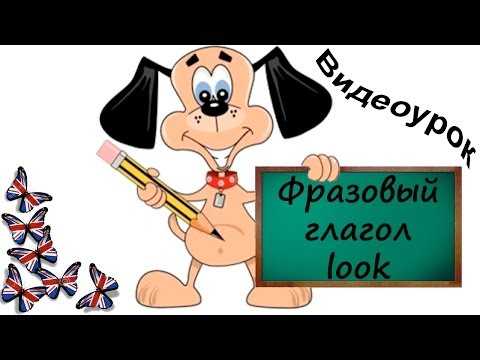
englsecrets.ru
Видеоновости — Поисковый онлайн видео сервис
Видеоновости — Поисковый онлайн видео сервис
Tired of missing premieres at the cinema because of the frenzied rhythm of life? Tired of the fact that on television, the films are being broadcasted at an inconvenient time for you? In your family, often your relatives divide the remote from the TV? The child asks to see cartoons for children, when you are busy, and on the channels there are no good cartoons? And, in the end, Do you just want to relax after a hard day on the sofa in your home clothes for watching an interesting movie or series?
To do this, it is best to always have a favorite site in your bookmarks, which will become your best friend and helper. And how to choose such a site, when there are so many? - you ask. The best choice for you will be Video-News
Why our resource? Because it combines many positive features that make it universal, convenient and simple. Here is a list of the main advantages of the resource.
Free access. Many sites ask customers to buy a subscription, than our portal does not deal with, because it believes that people should have free access to the Internet in everything. We do not charge viewers for our viewers!
You do not need any registration and SMS for questionable phone numbers. We do not collect confidential information about our users. Everyone has the right to anonymity on the Internet, which we support.
Excellent video quality. We upload content exclusively in HD format, which certainly can please your favorite users. It is much more pleasant to watch a good movie with a quality picture than with a picture of poor quality.
A huge choice. Here you will find a video for every taste. Even the most inveterate moviegoer will always find what to see from us. For children there are cartoons in good quality, cognitive programs about animals and nature . Men will find interesting channels for themselves about news, sports, cars, as well as about science and technology. And for our beloved women, we picked up a channel about fashion and style, about celebrities, and of course music videos. Having arranged an evening with your family, or with friends, you can pick up a merry family comedy. A loving couple to luxuriate in watching a love melodrama. After a day of work, a thrilling series or a detective helps to relax. Movies in HD format of the new time and past years are presented to absolutely any taste and can satisfy the needs of any viewer.
Ability to download video. Absolutely any material on the site can be downloaded to your computer or USB flash drive. If suddenly you are going to a dacha with a laptop where there is no internet, or you want to watch a movie on a big screen of the TV, you can always download in advance, and then look at the right time. In this case, you do not have to wait for your turn to download the video, as it happens on torrents or other similar sites.
Security. We monitor the cleanliness of the content, every file is checked before uploading. Therefore, there are no viruses and spyware on our site, and we carefully monitor this.
New. We regularly update and add new animations, serials, TV shows, music videos, news, reviews, animated series, etc. to the portal. and all this you can see for free, without registration and SMS. We are trying for you, for our favorite visitors.
Online browsing. On our site, it is not necessary to first download a movie to view it, simply turn it on and enjoy it. Thanks to the professional setup, there will be no braking, and nothing can stop you from watching an interesting movie.
Bookmark. On the site you can click a button with an asterisk to poison the video in the bookmarks and return to it later. Everyone, for certain, happened that he saw on the site an interesting video that you want to see, but right now there is no possibility. This button will help you with this and, having freed yourself, you can easily see what you like.
User-friendly interface. Finding the right video will not take you long, as the site is best adapted to users, and everything is intuitively understandable. Even a child will be able to understand and include for himself a cartoon or some program about animals, nature.
Cinema as art appeared relatively recently, but already managed to closely intertwine with our lives. A lot of people because of the haste of our time for years did not go to the theater, to the gallery or museums. However, it is difficult to imagine a person who did not watch the series or the film for at least a month. Cinema is a synthesis of theater, music, fine arts and literature. Thus, it gives even the most busy person, who does not have time to go to theaters and galleries, to be closer to art and to improve spiritually.
The cinema also occupied the sphere of public entertainment. Watch comedies, fighters, westerns, etc. perfectly fits into any some evening with my family. Horrors perfectly tickle the nerves of even the most fearless person. Cartoons adore children, and some can be viewed by the whole family. Cognitive videos help to expand knowledge, look at the world wider and satisfy your own natural curiosity.
A man in the twenty-first century can no longer imagine his life without the technology of the future, it seems that in the future, machines, robots and technics can replace a person, or rather perform many automatic works, so everyone wants to see what technologies will be in the future. On site you do not need to postpone the scan, just add the video to the bookmarks and at any time you can return to it and have a great time watching the quality video.
Do not deny yourself the pleasure, start watching right now! Meet the updates, with new items, choose what you would like to see later. Pleasure yourself and your family with interesting films in good quality!
videonews.guru
Wie ist das? 1 Tag auf dem Bauernhof || PULS Reportage
Опубліковано День тому
PULS Reportage
Тривалість: 12:46
Jung & Bauer: Sie arbeiten viel, tragen den ganzen Tag Gummistiefel und können nie in den Urlaub - so die Vorurteile von Stadtkind Ariane gegenüber Bauern. Stimmt das? Und wieso wird ein junger Mensch heute eigentlich noch Bauer? Ariane Alter begleitet Jungbauer Ralf Huber (28) für PULS Reportage einen Tag lang bei seiner Arbeit.Wie ist es jung und Bauer zu sein? Die in Berlin aufgewachsene Ariane Alter kann sich das Leben auf dem Bauernhof gar nicht vorstellen. Bauern arbeiten viel und bekommen wenig Wertschätzung. Vollzeit-Bio-Bauer Ralf liebt seinen Beruf trotzdem. Er verdient sein Geld mit Ackerbau und arbeitet zur Erntezeit 12 bis 15 Stunden am Tag, sechs Tage die Woche! Wieso tut er sich das an? Ariane Alter begleitet ihn für PULS Reportage einen Tag lang bei seiner Arbeit. Sie fährt im selbstfahrenden Hightech-Trecker über die Äcker, sät Saatgut und muss sich um Büroarbeit kümmern - denn auch das gehört zum Beruf des Bauern. Mit der Zeit versteht Ariane Alter immer besser, wieso Jungbauer Ralf seinen Job liebt. Bauer sein ist vielseitig - und es wird nie langweilig. Wer Bauer bzw. junger Landwirt ist, muss Allrounder sein: Technik, Botanik, Chemie, Bürokratie … das muss Ralf alles drauf haben! An der Seite des jungen Bauern merkt Ariane: Bauern werden immer moderner. Und Ralf ist das genaue Gegenteil des Klischees vom gummigestiefelten Einfallspinsel.Wer von euch möchte später mal Bauer werden oder ist vielleicht schon Bauer? Oder kennt ihr jemanden, der sich bewusst dagegen entschieden hat, Bauer zu werden? Schreibt es uns in die Kommentare! ----------------------------------------------------------- Hi! Wir sind Ariane Alter und Sebastian Meinberg von PULS, dem jungen Programm des Bayerischen Rundfunks. In unseren PULS Reportagen gehen wir jede Woche spannenden Fragen nach und starten gerne Selbstversuche. Jeden Mittwoch um 15 Uhr gibt’s eine neue Reportage - diese Woche zum Thema „Jung & Bauer: Wie ist das Leben als Bauer?“.Begleite Ariane Alter zu ihren Besuch beim Bauern auf Instagram: instagram.com/namealter/ Begleite Sebastian Meinberg bei seinen Recherchen: instagram.com/heinz.wescher/----------------------------- Social Media: ► Facebook: facebook.com/PULS ► Twitter: twitter.com/puls_br ► Instagram: instagram.com/deinpuls ► Snapchat: snapchat.com/add/puls_br ► PULS ist das junge Programm des Bayerischen Rundfunks im Radio, Fernsehen & Online. deinpuls.de
Bauer Leben auf dem Bauernhof Jungbauern Jung und Bauer Traumberuf Bauer Traumberuf Landwirt Landwirt junge Landwirte Bauer sucht Frau Bauernverband Bauer Deutschland Bauer in Deutschland deutscher Bauer Bauernhof Deutschland Beruf Landwirt Ausbildung Landwirt Bauernhof Sebastian Meinberg Ariane Alter Puls Reportage Bayerischer Rundfunk Unser land Bauernhof Doku Bauernhof Reportage Landwirtschaft Doku
ua-films.com
Глагол to look и особенности его употребления в английском языке
Среди наиболее распространенных глаголов английского языка, порождающих большое количество устойчивых выражений и фразовых глаголов, отдельного описания, несомненно, достоин глагол to look. Ведь ему свойственен целый спектр разнообразных значений. А то, что он, не смотря на свое широкое распространение, является правильным глаголом, не сможет не обрадовать тех, кто устал от заучивания таких «непослушных» форм неправильных глаголов.
Значения
| смотреть | Look at the sky! There is a big plane above us. | Посмотри на небо! Над нами большой самолет. |
| выглядеть | You look terrific! Have you got a new hair-cut? | Ты выглядишь потрясающе! У тебя новая стрижка? |
| рассматривать | Let’s look at this issue carefully and try to find a way out. | Давайте внимательно рассмотрим этот вопрос и попытаемся найти выход. |
| слушать, воспринимать | Look here! I’m talking to you. | Послушайте! Я с вами говорю. |
| осматривать | The doctor looked at the patient very carefully. | Доктор очень внимательно осмотрел пациента. |
Несложно заметить, что все эти значения так или иначе связаны с базовым значением этого глагола – «смотреть».
Грамматика
Несмотря на свое широкое распространение в речи, данный глагол принадлежит к группе правильных глаголов, а это значит, что его основные формы, представленные в таблице ниже, образуются согласно правилам путем добавления окончания -ed:
| the Infinitive (инфинитив, начальная форма) | the Past Simple Tense (прошедшее простое время) | the Past Participle (причастие прошедшего времени) |
| to look | looked | looked |
| I like to look at the sky at night./ Я люблю смотреть на небо ночью. | Alex looked at his friends with an expression of bitterness and sadness on his face. / Алекс посмотрел на своих друзей с выражением горечи и грусти на своем лице. | I have just looked at her. / Я просто посмотрел на нее. |
Во временах активного залога глагол to look спрягается также, полностью опираясь на правила, поэтому не доставит изучающим английский язык особых хлопот:
| Simple | Continuous | Perfect | Perfect Continuous | |
| Present | the Present Simple Tense look / looks She looks after the child when its parents are away. / Она присматривает за ребенком, когда его родители отсутствуют. | the Present Continuous Tense am / is / are looking You are looking so smart today! / Ты выглядишь так элегантно сегодня! | the Present Perfect Tense have / has looked I have already looked up this word in all the dictionaries I have. / Я уже посмотрел это слово во всех словарях, которые у меня были. | the Present Perfect Continuous Tense have / has been looking He has been looking at her walking away instead of making her come back. / Он смотрел на то, как она уходила вместо того, чтобы заставить ее вернуться. |
| Past | the Past Simple Tense looked Tom looked quite miserable that day. / Том выглядел довольно несчастным в тот день. | the Past Continuous Tense was / were looking I opened my eyes and noticed that everybody was looking at me. / Я открыл глаза и заметил, что все смотрели на меня. | the Past Perfect Tense had looked Tom had already looked up all the necessary information about that country when he came back. / Том уже подсмотрел всю необходимую информацию о той стране, когда вернулся обратно. | the Past Perfect Continuous Tense had been looking When we found him at the pier he had been looking at the sea and arriving and departing ships for many hours. / Когда мы нашли его у пирса, он уже много часов смотрел на море и прибывающие и уходящие корабли. |
| Future | the Future Simple Tense will look Alice decided that she will look surprised though she knew about the surprising party prepared at her house. / Элис решила, что будет выглядеть удивленной, хотя она уже знала о сюрпризной вечеринке, подготовленной у нее дома. | the Future Continuous Tense will be looking I was afraid that everybody will be looking at me and laughing because of my silly clothes. / Я боялся, что все будут смотреть на меня и смеяться из-за моей глупой одежды. | the Future Perfect Tense will have looked I hope by the time the teacher comes you will already have looked at my answers to the test and will have brought my copy-book back. / Я надеюсь, что к тому времени, как придет учитель, ты уже посмотришь мои ответы к тесту и вернешь мою тетрадь обратно. | the Future Perfect Continuous Tense will have been looking How long will you have been looking at me? Stop it immediately! / Как долго ты еще будешь смотреть на меня? Прекрати это немедленно! |
Несмотря на отсутствие прямого дополнения при этом глаголе, в большинстве значений он требует употребления дополнения после предлога, а поскольку предлоги при глаголе to look часто свидетельствуют о его фразовом характере, то можно с уверенностью говорить о том, что при употреблении с большинством предлогов глагол to look является переходным . Тогда как употребляемый без предлога глагол to look, например, в значении «выглядеть», является непереходным. Поэтому to look с предлогом (послелогом) довольно часто встречается в формах страдательного залога Passive Voice . Такие формы представлены в таблице, приведенной ниже:
| Simple | Continuous | Perfect | Perfect Continuous | ||
| Present | Such people as she are always looked at with respect and admiration. / На таких людей, как она, всегда смотрят с уважением и восхищением. | The unusual models of hats, huge but gorgeous, are being looked at by the visitors of the exhibition with a lot of interest. / Необычные модели шляп, огромные и прекрасные, рассматриваются посетителями выставки с большим интересом. | All unknown words have been looked up in a dictionary. Now we can easily translate the text. / Все незнакомые слова найдены в словаре. Сейчас мы можем легко перевести текст. | — | |
| Past | All the necessary words were looked up in the dictionary yesterday. /Все необходимые слова были найдены в словаре вчера. | When I entered the studio my pictures and drawings were being looked at by some unknown visitors. / Когда я вошел в мастерскую, мои картины и рисунки разглядывались несколькими незнакомыми посетителями. | Those difficult words had been looked up before we started to translate the text. / Те трудные слова были найдены в словаре, прежде чем мы начали переводить текст. | — | |
| Future | The new wedding dress will be looked at tomorrow morning. /Новое свадебное платье будут смотреть завтра утром. | — | Those strange words will have been looked by the time we begin to translate those difficult texts. / Те странные слова уже будут найдены в словаре к тому времени, как мы начнем переводить те трудные тексты. | — | |
В своем базовом значении «смотреть» данный глагол употребляется с предлогом at:
| Look at me please! | Посмотри на меня, пожалуйста! |
Устойчивые выражения
| Look here! | Посмотри(те) сюда! |
| Look ahead! | Осторожней! |
| Look this way! | Посмотри(те) сюда! |
| Look that way! | Посмотри(те) туда! |
| Look! | Послушай(-те)! |
Фразовые глаголы с основой to look
| to look at | смотреть на | He wanted to look at her, but he wasn’t able to. | Он хотел посмотреть на нее, но не мог. |
| to look around | осмотреться, оглядеться | Look around! The world is so beautiful! | Оглянись вокруг! Мир так прекрасен! |
| to look about | Let’s look about and try to find your earring. | Давай оглядимся и попробуем найти твою серьгу. | |
| to look after | присматривать за | Please look after my old granny as long as I am at school. | Пожалуйста, присмотрите за моей старенькой бабушкой, пока я буду в школе. |
| to look ahead | заглядывать в будущее | I’m not a prophet. I can’t look ahead. | Я не прорицатель. Я не могу предсказывать будущее. |
| to look back | оглядываться | Never look back: you can’t return the past. | Никогда не оглядывайся: ты не сможешь вернуть прошлое. |
| to look down (on) | смотреть свысока; потупить взор | I realize that you always look down on me and my mistakes. | Я понимаю, что ты всегда смотришь на меня и мои ошибки свысока. |
| to look for | искать | — I’m looking for my glasses. — Really? They are on your head. | — Я ищу свои очки. — Правда? Они у тебя на голове. |
| to look forward to | ждать с нетерпением | All students always look forward to their holidays. | Все учащиеся всегда ждут с нетерпением своих каникул. |
| to look in | заглянуть в гости к кому-либо | Look in on Friday! I’ll make a cake. | Загляни в гости в пятницу! Я буду печь торт. |
| to look into | исследовать, расследовать | Let’s look into the problem of environment protection in our city. | Давайте рассмотрим проблему защиты окружающей среды в нашем городе. |
| to look on | смотреть на кого-то как на…, считать кем-либо | Jane looks on Tom as her brother. | Джейн смотрит на Тома как на брата. |
| to look out for | поискать | I’m going to look out for a new flat. | Я собираюсь поискать новую квартиру. |
| to look through (over) | просматривать | Have you looked through this part of the poem? | Вы уже просмотрели эту часть стихотворения? |
| to look to | рассчитывать на | We’re looking to your help. | Мы рассчитываем на твою помощь. |
| to look up | получить справку, посмотреть, подсмотреть информацию в справочнике | I prefer to look up the meaning of new words in the dictionary. | Я предпочитаю узнавать значение новых слов из словаря. |
Различия глаголов to look, to see, to glance, to stare, to peep
У глагола to look есть много сходных с ним по значению глаголов. Однако они отнюдь не являются абсолютными синонимами, различаясь либо семантикой, либо стилистикой:
| to see | видеть (результат процесса восприятия, тогда как to look – процесс зрительного восприятия) | Jane seemed to look at the pictures in the book but actually she couldn’t see them because of tears in her eyes. | Казалось, что Джейн смотрела на картинки в книге, но на самом деле она не могла их видеть из-за слез в ее глазах. |
| to glance | бросить беглый взгляд | The teacher glanced at my work and walked to other students. | Учитель бегло глянул на мою работу и пошел к другим студентам. |
| to stare | уставиться, таращиться | Why are you staring at me like that? | Почему ты так уставился на меня? |
| to peep | заглянуть, подсмотреть | I saw my desk mate peeping at my test. | Я видел, как мой сосед по парте подглядывал в мой тест. |
Автор- Александра Певцова
1hello.ru
look формы глагола | Английский язык для всех
Глагол look — правильный глагол, поэтому образование его форм подчиняется общему правилу.
look формы глагола
Первая форма глагола lookВторая форма глагола lookedТретья форма глагола looked
Глагол правильный, поэтому вторая и третья форма глагола совпадает.
Важно не путать глагол look с глаголом see, который неправильный. Формы глагола see: see saw seen
Примеры предложений с различными формами глагола look
| № | Предложения | Перевод на английский язык |
| 1 | Я взглянул на него | I looked at him |
| 2 | Мы посмотрели на звезды | We looked at the stars |
| 3 | Она посмотрела на это с любопытством | She looked at it with curiosity |
Важно также сказать о том, что если мы говорим «взглянуть на кого-то», но нужно употреблять глагол look с предлогом at.
Но это далеко не единственный предлог, который может употребляться с look. Следует также знать:look for (искать)look into (исследовать)look through (просматривать)
Иногда после look вообще не нужен предлог. Пример предложений с глаголом look без предлога.Примеры:1.Он выглядел счастливым2.Она выглядела уставшей
Перевод на английский язык:
He looked happyShe looked tired
bebris.ru
Правильные и неправильные глаголы
Правильные и неправильные глаголы
Все глаголы в английском языке делятся на правильные и неправильные. Прошедшее время у правильных и неправильных глаголов образуется по-разному. К основе правильных глаголов добавляется суффикс -ed.
Сравните произношение этого суффикса: to work - worked [t] (основа заканчивается на глухой согласный)
to play - played [d] (основа заканчивается на звонкий согласный или гласный)
to rest - rested [id] (основа оканчивается на -t или -d)
Если глагол заканчивается на у, и перед у стоит согласная, то при добавлении -ed буква у переходит в i: to study studied (учиться - учился).
Если глагол заканчивается на -е, добавляем только d: die - died (умирать - умер).
Конечная согласная удваивается перед суффиксом -ed, если ей предшествует краткий ударный гласный: to plan - planned.
Неправильные глаголы образуют простое прошедшее время не по общему правилу. Их следует запомнить: to do - did (делать - делал) to go - went (идти - ходил)
В словарях и учебниках обычно приводится таблица неправильных глаголов. Прошедшее простое время дается во второй колонке (вторая форма глагола). Неправильных глаголов сравнительно немного (около 200), но к ним относятся самые употребительные и важные слова. Знать их совершенно необходимо.
Упражнение 2. Выучите следующие правильные глаголы и образуйте от них прошедшую форму.
[t] to bake - печь
[d] to clean - убирать
[t] to cook - готовить (обед)
[d] to call - звонить ft] to dance - танцевать
[id] to dust - протирать пыль
[t] to fix - ремонтировать
[d] to happen - случаться
[id] to invite - приглашать
[t] to like - нравиться
[d] to listen - слушать
[t] to look - смотреть
[t] to miss - опаздывать
[id] to paint - красить
[d] to play - играть
[d] to prepare - готовить
[id] to rest - отдыхать
[d] to shave - бриться
[id] to shout at - кричать (на)
[d] to stay - оставаться
[id] to study - учиться
[id] to skate - кататься на коньках
[d] to ski - кататься на лыжах
[t] to talk - разговаривать
[id] to visit - навещать, посещать
[id] to wait (for) - ждать
[t] to watch - смотреть, наблюдать
Упражнение 3. Расскажите о том, чем Вы занимались вчера. Помните о трояком произношении суффикса -ed.
[d]: я побрился, послушал радио, поиграл на гитаре, катался на лыжах, убирал в квартире, звонил друзьям.
[t]: готовила обед, пекла пироги, чинила автомобиль, опоздала на автобус, разговаривала с друзьями, смотрела телевизор.
[id]: протирали пыль, красили окна, катались на коньках, ходили в гости к друзьям, отдыхали.
Упражнение 4. Сравните привычные для Вас действия (в английском они выражаются простым настоящим) и действия, совершенные в прошлом (простое прошедшее).
Например: I always shave in the morning - Yesterday I shaved too.
Продолжайте. Помните о чтении суффикса -ed.
I always wait for my wife at my bus stop. -
I study English every day. -
I play football on my weekend. -
I often visit my friends in the suburbs. -
In winter I skate and ski. -
Every evening I watch TV and listen to music. -
Выучите неправильные глаголы
В таблице даны три формы. Первая форма - начальная. Это инфинитив, отвечающий на вопрос что делать?
Вторая форма - простое прошедшее время: что делал?
Третья форма - причастие II. Эту форму можно перевести при помощи модели: «кем-то делаемый», «сделанный». Эта форма понадобится Вам для образования перфекта и страдательного залога.
| I форма (инфинитив или неопределенная форма) что делать? | II форма (простое прошедшее время) что делал? | III форма (причастие II) кем-то делаемый, сделанный | Основное значение |
| 2. be | was/were | been | быть |
| 3. bear | bore | bom | родить, нести |
| 4. beat | beat | beaten | бить |
| 5. become | became | become | стать |
| 6. begin | began | begun | начать |
| 7. bite | bit | bit(ten) | кусать |
| 8. blow | blew. | blown | дуть |
| 9. break | broke | broken | (с)ломатъ |
| 10. bring | brought | brought | приносить |
| 11. build | built | built | строить |
| 12. bum | burnt | burnt | жечь, гореть |
| 13. buy | bought | bought | купить |
| 14. catch | caught | caught | ловить |
| 15. choose | chose | chosen | выбирать |
| 16. come | came | come | приходить |
| 17. cost | cost | cost | стоить |
| 18. cut | cut | cut | резать |
| 19. do | did | done | делать |
| 20. draw | drew | drawn | рисовать, |
| 21. dream | dreamt | dreamt | мечтать |
| dreamed | dreamed | ||
| 22. drink | drank | drunk | пить |
| 23. drive | drove | driven | ехать |
| 24. eat | ate | eaten | есть |
| 25. fall | fell | fallen | падать |
| 26. feed | fed | fed | кормить |
| 27. feel | felt | felt | чувствовать |
| 28. fight | fought | fought | сражаться |
| 29. find | found | found | находить |
| 30. fly | flew | flown | летать |
| 31. forget | forgot | forgotten | забыть |
| 32. freeze | froze | frozen | замораживать, |
| замерзнуть | |||
| 33. get | got | got | получать |
| 34. give | gave | given | давать |
| I форма | 11 форма | III форма | Основное |
| (инфинитив или | (простое | (причастие II) | значение |
| неопределенная | прошедшее | кем-то делаемый, | |
| форма) | время) | сделанный | |
| что делать? | что делал? | ||
| 35. go | went | gone | идти |
| 36. grow | grew | grown | расти |
| 37. hear | heard | heard | слышать |
| 38. hold | held | held | держать, проводить (собрание) |
| 39. hurt | hurt | hurt | повредить, ушибать, обидеть |
| 40. keep | kept | kept | хранить, держать |
| .41. know | knew | known | знать |
| 42. lay | laid | laid | класть, положить |
| 43. lead | led | led | руководить |
| 44. learn | learnt | leamt | учить |
| learned | learned | ||
| 45. leave | left | left | оставлять, уезжать |
| 46. lie | lay | lain | лежать |
| 47. lose | lost | lost | терять |
| 48. light | lit | lit | освещать |
| 49. make | made | made | делать |
| 50. mean | meant | meant | подразумевать |
| 51. meet | met | met | встречать |
| 52. pay | paid | paid | платить |
| 53. put | put | put | класть |
| 54. read | read | read | читать |
| 55. ring | rang | rung | звонить |
| 56. run | ran | run | бежать, течь |
| 57. say | said | said | говорить, сказать |
| 58. see | saw | seen | видеть |
| 59. sell | sold | sold | продавать |
| 60. send | sent | sent | посылать |
| I форма (инфинитив или неопределенная форма) что делать? | II форма (простое прошедшее время) что делал? | III форма (причастие II) кем-то делаемый, сделанный | Основное значение |
| 61. shoot | shot | shot | стрелять |
| 62. shut | shut | shut | закрывать |
| 63. sing | sang | sung | петь |
| 64. sit | sat | sat | сидеть |
| 65. sleep | slept | slept | спать |
| 66. spend | spent | spent | тратить |
| 67. stand | stood | stood | стоять |
| 68. steal | stole | stolen | украсть |
| 69. swim | swam | swum | плавать |
| 70. take | took | taken | брать |
| 71. teach | taught | taught | учить, пpenодавать |
| 72. tell | told | told | рассказать |
| 73. think | thought | thought | думать |
| 74. understand | understood | understood | понимать |
| 75. wake | Г woke | Г woken | пробуждаться, |
| 76. wear | “1 waked | "1 waked | просыпаться |
| wore | worn | носить одежду | |
| 77. win | won | won | выигрывать |
| 78. write | wrote | written | писать |
Упражнение 5. Дайте начальную форму следующих глаголов:
lain, won, drove, froze, ate, chose, built, bought, found, stood, came, kept, ran, thought, left, slept, spent, sent, felt, shone, sold.
Упражнение 6. Проверьте, правильно ли переведена форма глагола:
began - начато, swam - плывут, slept - спал, chosen - выбран, drew - нарисовал, cost - стоить, seen - увиденный, caught - поймал, spoken - сказал, lie - положил, make - делал, see - видел, known - знал.
Упражнение 7. Определите формы следующих глаголов. Переведите их на русский язык:
fell, felt, ate, done, begun, understood, told, caught, found, sent, left, forgotten, grew, went, lost, given, broke, spoken, eaten, taught.
www.englishadv.narod.ru
look формы глагола | Английский язык для всех
Перевод look на русский язык — посмотреть, взглянуть. Если мы говорим, на что мы смотрим, то мы используем предлог at.
Пример:Look at meI looked at her
Перевод данных предложений на русский язык:Посмотри на меняЯ посмотрел на нее
Глагол look — это правильный глагол. Образование его форм подчиняется общему правилу.
look формы глагола
первая форма глагола look — look (первая форма это и есть сам глагол)вторая форма глагола look — lookedтретья форма глагола look — looked
2ая и 3ья формау данного глагола, как и у всех правильных глаголов, не отличаются и имеются окончание ed.
Следует заметить, что очень часто студенты делают ошибки не в использовании форм глагола look, а в правильном употреблении его в контексте. Часто делается ошибка именно на предлог.
Упражнение на использование форм глагола look
Даны предложения на русском языке. Переведите их на английский язык
1. Он взглянул на меня2. Мы взглянули на звезды3. Не смотри на меня4. Посмотри на упражнение еще один раз5. Тебе нужно посмотреть на свои ошибки
Ответы к упражнению
Перевод данных упражнений на английский язык1. He looked at me2. We looked at the stars3. Don’t look at me4. Look at the exercise one more time5. You need to look at your mistakes
look формы глагола пояснения к упражнению
Чтобы успешно выполнить данное предложение, нужно просто запомнить выражение look at (посмотреть на что-то или на кого-то). Также нужно уметь использовать повелительную форму в утверждении и отрицании. Чтобы образовать отрицание, нужно использовать Don’t вначале предложения. Очень важно также не забыть поставить to после need, так как здесь используется инфинитив. Вообще есть конструкция:need to do something — нужно что-то сделать
Также следует сказать, что могут употребляться и другие предлоги после look. Но тогда уже появляется новое значение. Необходимо знать следующие фразовые глаголы с look:look for — искатьlook forward to — c нетерпением ждать чего-тоlook like — быть похожимlook after — заботитьсяlook on -наблюдатьlook back — оглядываться в прошлоеlook through — просматриватьlook down — презиратьlook up — уважать
bebris.ru

